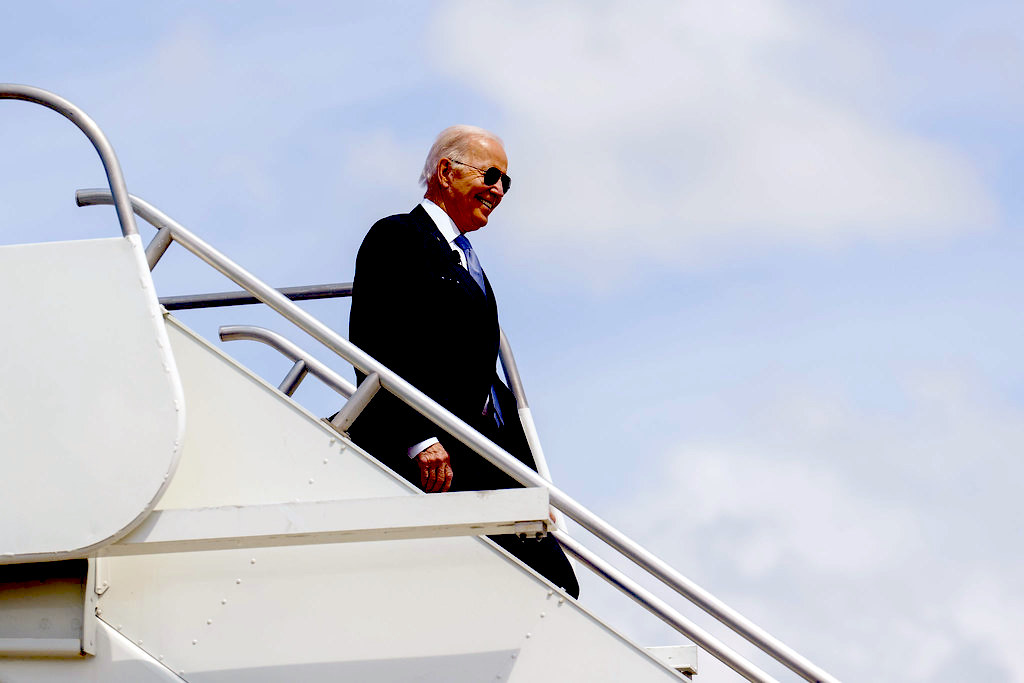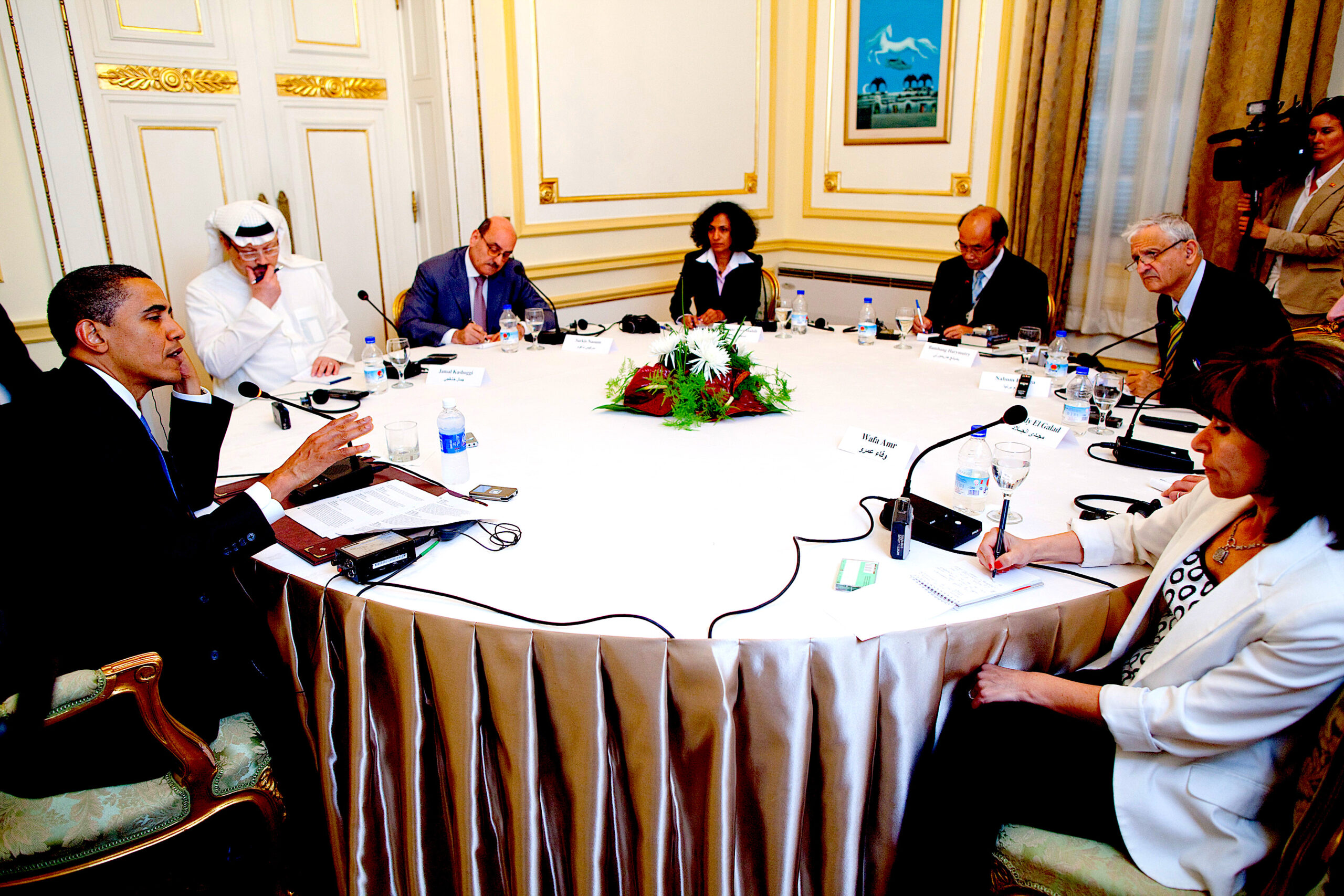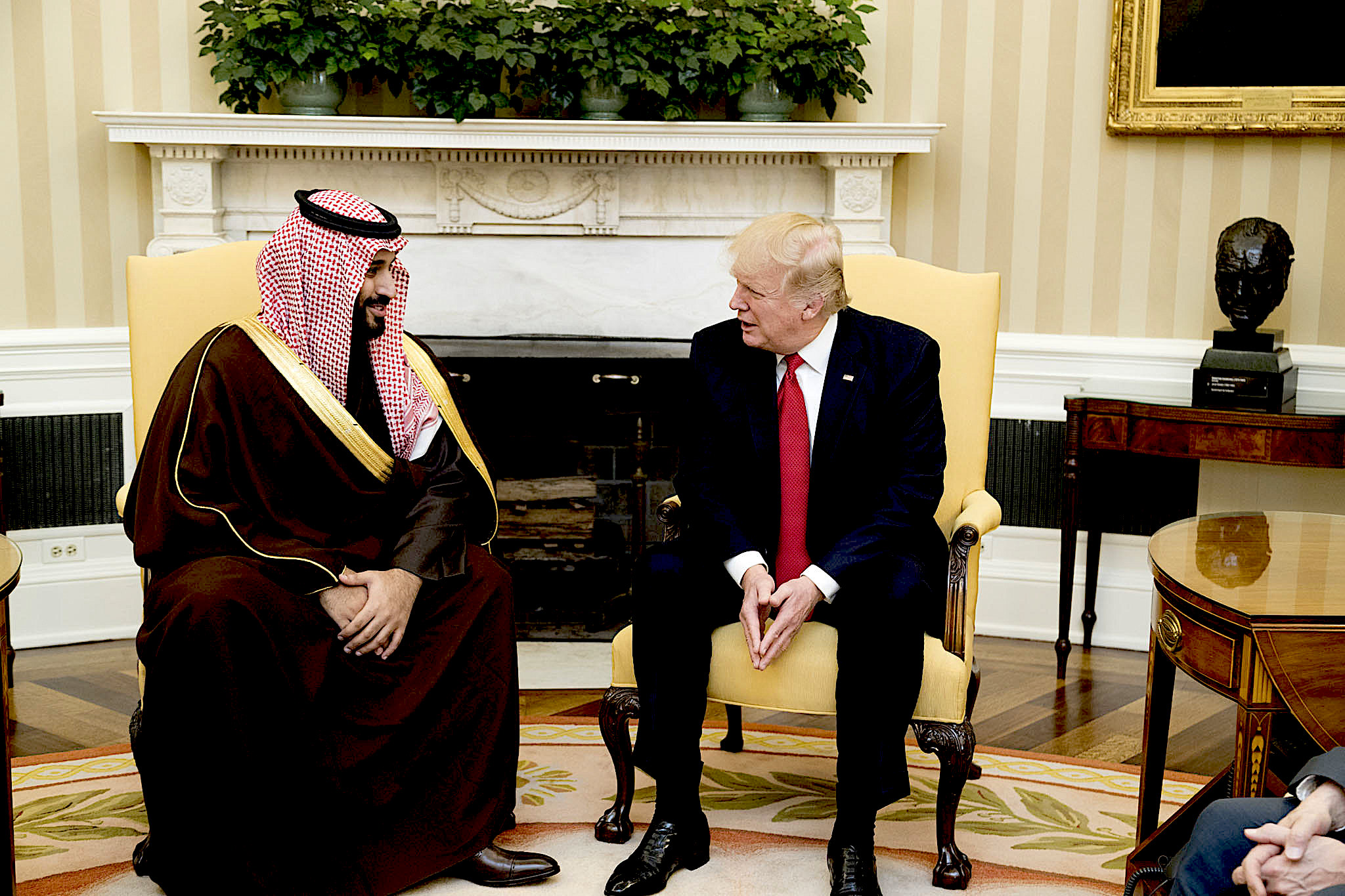The U.S. president will be seen smiling with MbS and questions about Khashoggi’s murder, or the murder of other dissidents who were beheaded, will be dismissed in the name of “Arab-Israeli peace.”

U.S. President Joe Biden disembarking Air Force One, file photo. (White House Photo, Adam Schultz)
By As`ad AbuKhalil
Special to Consortium News
 President Joe Biden has embarked on a Middle East trip that will include a visit to Saudi Arabia and a meeting with Crown Prince Muhammad Bin Salman.
President Joe Biden has embarked on a Middle East trip that will include a visit to Saudi Arabia and a meeting with Crown Prince Muhammad Bin Salman.
So, it’s now official, the Biden administration will forget about the murder of Jamal Khashoggi and the war in Yemen. The U.S. has only gently pressured Saudi Arabia and the United Arab Emirates to observe a truce in Yemen in return for designation of the Houthi rebels as terrorists. (It is illustrative of how political the U.S. government’s definition of terrorism is that Houthi rebels — who never perpetrated acts of international terrorism — are designated as terrorists merely as a political gesture toward Gulf despots.)
Biden will swallow the promises and words he uttered during the presidential campaign (when he forcefully chided the Saudi regime and MbS personally) as he cares more about U.S. public opinion and the mid-term elections than human rights considerations. Gas prices for electoral purposes always trump lofty ideals. But when did U.S. presidents ever care about human rights in their relationships in the Arab world? U.S. presidents care about human rights violations only in countries where rulers are not aligned with the U.S. and Israel.
After his stop in Israel, Biden will travel to Saudi Arabia chiefly to line-up Gulf countries with U.S. foreign and economic policies. His first priority is an agreement for increased oil production and Saudi Arabia has the most oil to offer. Biden is concerned mainly about his political fortune (and the sagging political fortunes of his party), and the foreign policy establishment in Washington (much of it beholden to Gulf money) has been urging Biden to basically disregard human rights as an element in U.S. foreign policy in the Gulf region.
Biden will also attempt to provide security guarantees for the regimes and perhaps he will reach treaty arrangements. Saudi Arabia has already signed a security treaty with France, and the U.S. may be offering similar arrangements, which won’t conflict with long-established U.S. foreign policy priorities.
It is possible the U.S. will create a security umbrella for the region’s regimes and possibly extend to both Saudi Arabia and the UAE the senior, non-NATO membership status that was recently accorded to their rival, Qatar.
In the Name of ‘Peace’

U.S. President Barack Obama at far left, with Jamal Khashoggi to his left, during a June 4, 2009, roundtable. (The White House, Wikimedia Commons)
Fantastically, Biden has been selling his controversial overtures to MbS as part of an effort to end Arab-Israeli wars, as if the UAE and Saudi Arabia have a long history of wars with Israel. Saudi opposition groups in Washington have expressed alarm over the recent gestures of reconciliation between Biden and MbS but all Arab opposition groups, which have in the past pinned their hope on the U.S. government, have been woefully disappointed. Biden will be seen smiling with MbS and questions about Khashoggi’s murder (or about the murder of other dissidents who were beheaded) will be dismissed in the name of “Arab-Israeli peace.”
Unhappy With US
Gulf countries, primarily the UAE and Saudi Arabia (we can include Bahrain as a Saudi vassal), have recently expressed displeasure with the U.S. role in the region. They are unsatisfied — they want more U.S. military intervention and more war.
How have Saudi Arabia and the UAE been showing their displeasure with Biden?
First, the countries (especially the UAE) have a financial stake in many of the D.C.-based think tanks and their embassies cultivate — in the line with the Shah’s embassy of yesteryear — relations with all top journalists. The UAE ambassador is famous for hosting lavish dinner parties, football barbecues and has flown journalists to the Gulf to watch car races.
Second, it was reported that leaders of both the UAE and Saudi Arabia declined calls from Biden. While that story is hard to believe, it may be part of the UAE-KSA propaganda campaign to signal their political dissatisfaction. Both leaders have actually been desperate to arrange a meeting with Biden. It is unlikely that both leaders who have lobbied feverishly to meet with Biden would not take his calls.
Third, the two countries have been solidifying their alliance with Israel (openly in the case of the UAE and secretively in the case of Saudi Arabia). In the past, Gulf countries opened relations and held discussions with the Israeli government as a way to impress Washington. In recent years, Gulf countries solidified relations with Israel in order to obtain security arrangements that bypass the U.S. government. They assumed that Israel is a better ally against Iran than a cautious U.S.
Alliance with Israel, for those Gulf despots, has become an alternative to what they find as inadequate American commitment to Gulf security (Gulf security is a formal term for the U.S. commitment to the longevity of despotic regimes when in alliance with Washington).
Fourth, the UAE and Saudi Arabia have been acting independently of Washington in their response to the Russian invasion of Ukraine. At the U.N., the UAE abstained from casting a vote against Russia. Even on sanctions against Russia, both countries — as the Russian foreign minister announced — refused to follow the U.S. lead. While the U.S. stands with its despots throughout the region, Gulf countries are still angry that former President Barack Obama allowed the Egyptian and Tunisian rulers to be overthrown (although, to be fair to Obama, the U.S. administration at the time tried its best to save both despots from the wrath of their people but it was too late).
Fifth, both countries have refused U.S. pressure to increase the production of oil during the energy crisis that followed the Russian invasion of the Ukraine. High oil prices serve the purposes of MbS who has major exorbitant domestic projects and foreign adventures in the region to pay for, especially in Yemen. The oil price is a key ingredient in U.S.-Saudi relations and Biden has just realized that he needs to shift course in the relationship between the two countries.
Missing Trump

March 14, 2017: Mohammed bin Salman bin Abdulaziz Al Saud, or MBS, with President Donald Trump in Washington. (White House, Shealah Craighead)
The despots had their best leader in Trump. He never pretended to care about human rights; the man was quite frank about his expectations and requirements for good relations. He wanted investment and mega arm purchases in return for U.S. blanket support for regional tyranny.
The idea that presidents before Trump shied away from total support for despots is typical of the U.S. media rhetoric against Trump. They wanted to instill the view that Trump, unlike all previous Republican and Democratic presidents, deviated from standard foreign policy principles in support of pro-U.S. dictators worldwide.
There’s no doubt most mainstream U.S. media suffer from an acute case of Democratic Party bias. (It’s not a liberal bias because these journalists show little concern for the downtrodden who — one would think — would matter to liberals.) Instead, the media suffer from a strong bias in favor of the war establishment: The Wall Street Journal, The New York Times, MSNBC, The Economist and all the others are in agreement. Normally the media tries to cloak these biases. But with the advent of Donald Trump pretenses were dropped. Social media has further demolished the theater of objectivity as journalists compete with each other to show their staunch support for intervention and more military aid to pro-U.S. despots worldwide.
Thus, it will be interesting to see whether U.S. establishment media, which normally ignores Saudi human rights abuses but was scathing after the Khashoggi murder, gives Biden a pass for going back on his word and meeting MbS. With its largely Democratic Party bias, it too has a stake in the outcome of November’s congressional elections.
As`ad AbuKhalil is a Lebanese-American professor of political science at California State University, Stanislaus. He is the author of the Historical Dictionary of Lebanon (1998), Bin Laden, Islam and America’s New War on Terrorism (2002) and The Battle for Saudi Arabia (2004). He tweets as @asadabukhalil
The views expressed are solely those of the author and may or may not reflect those of Consortium News.

Apart from the rhetoric, of course, the downtrodden don’t matter to liberals.
Most liberals are not in positions of power. When so-called liberal parties are in power, the membership is more concerned with their own welfare. The leadership is more concerned with staying in power and foreign people don’t have votes.
Biden will do what he does best, stumble, mumble and get confused. The real negotiations will happen elsewhere. All else will be the usual empty words, rhetoric, lies and deception – what we’ve come to expect from the US and its allies.
After the sanctions debacle of the last few months, nobody is ever going to trust the US again. The only possible deals with them would have to be on a ‘payment first’ basis, into banks beyond the reach of the west, or in goods and commodities that can’t be seized.
I think we’ll never get dems or Republican to do anything about Kashogi’s beheading because it was a desperate act to keep him from ever talking about the Saudi Arabia governments direct role in planning and executing 9/11. Looking further into SA’s role in 9/11 would potentially open them to further danger re the 9/11 Family’s law suit but also the role of Mueller’s FBI ( and Mueller himself) in covering up SA’s role in…9/11
My theory is that Gulfie despots where dismayed by the casual application of extreme sanctions by the West in respect to Russia. Every single ostensible motivation for those sanctions applies to them, so “there but for the Mercy of Allah go I”.
Commodity exporters, especially oil and gas, have to stash foreign currencies in fat years when the prices are high to survive without heavy social disruptions lean periods of low prices. Those accounts we blithely confiscated for Venezuela for the crime of conducting elections in which opposition parties refused to participate (if I can decipher the ostensible reasons), Trump threatened to freeze Iraqi accounts, would Iraq proceed with the eviction of American troops (something that KSA did in the past), and now Russia. KSA and UAE could console themselves that the West would not dare to take their money because of heavy disruption to their economies, but apparently, relying on the remaining shreds of Western wisdom is a thin reed indeed (Kings 2 18-21).
The personal sanctions on “Russian oligarchs” would be applicable to Gulfie elites too.
In short, it is national and personal elite interests in Arab countries, like in many other countries like India and Brazil, that this sanction war will fail. And it seems that oil prices are now falling, but not for the reason that the West hoped for, cooperation from Gulfies believed to be vassals. Instead, “demand destruction” in the form of economic recession in the West is at work, so as gasoline prices are falling but increased production costs keep pushing inflation up, Western governments are shaky, and the remaining obedient followers are affected as well.
At least the truth about US foreign policy is still spoken and printed somewhere. Thanks.
Like water off a ducks back, the Democratic Party’s attitude towards deceit, duplicity and hypocrisy. Actually, it’s a point of pride given how accepting of delusion it’s base has become.